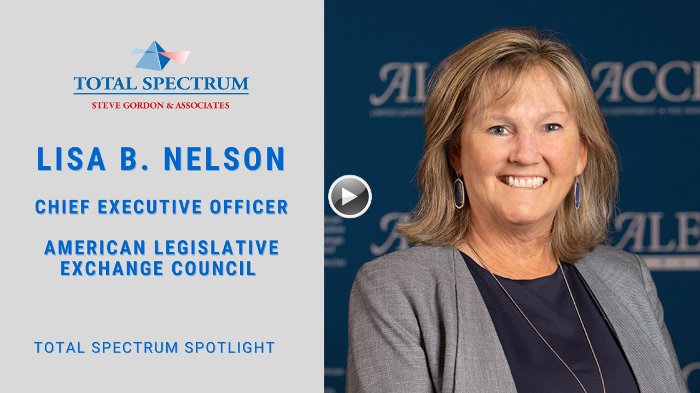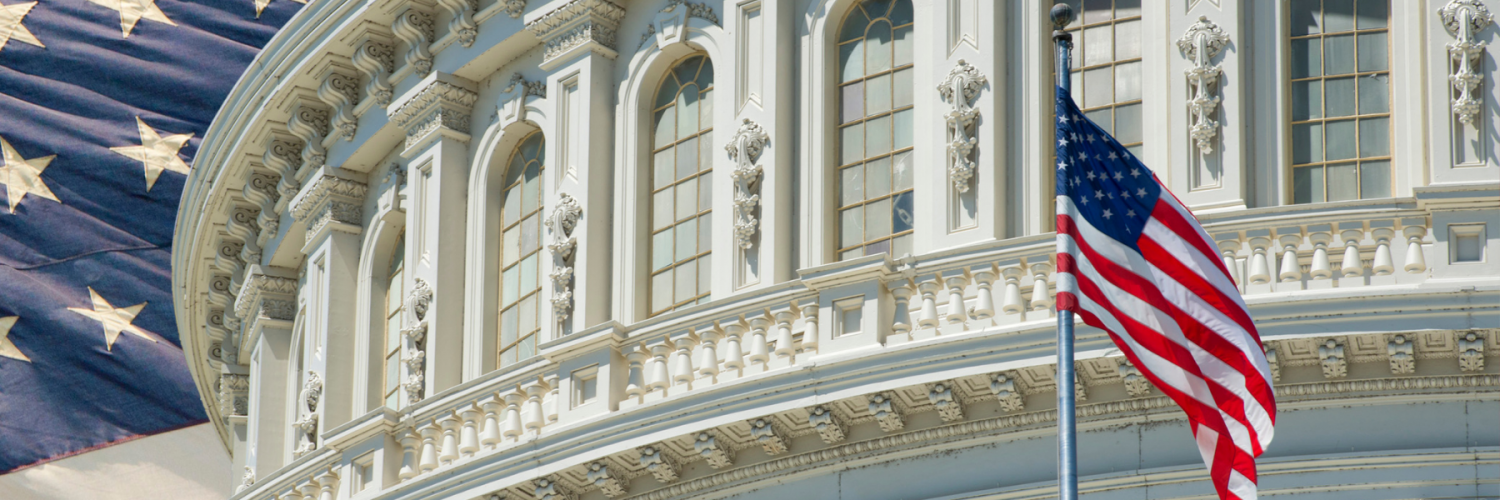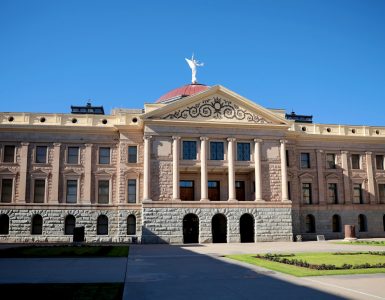Latest news from Washington, D.C. produced by Total Spectrum/SGA exclusively for members of the Arizona Chamber of Commerce & Industry
More Info: Michael DiMaria | Partner and Vice President of Business Development | 602-717-3891 | [email protected]

Congress returned to Washington this week. At the top of Senate Democrats’ to-do list is building a consensus on a slimmed-down Build Back Better bill against the backdrop of a spiking inflation rate and signs of a slowing economy.
Heard on the Hill describes some of the major items that are being discussed for inclusion in this new plan. We also talk about why Senate Democrats are revisiting a slimmed down version of this bill and why it could get even slimmer. Then we close with some economic odds and ends.
Congressman Erik Paulsen was Chairman of the Congressional Joint Economic Committee as well as a member of the House Ways and Means Committee. Erik left last Friday for a trip overseas, but before he left he wrote a wonderful article entitled “Inflation and a Slowing Economy – What to do About Both.” He describes how inflation got loose, how it will impact consumers, and how the additional cost to the federal government of interest on the debt is going to dwarf major programs and squeeze many other programs. Congressman Paulsen also suggested steps that would help to get our economy going again, and he talks about ideas that would do more damage.
On Wednesday morning the Bureau of Labor and Statistics released June’s inflation rate, which increased from 8.58% in May to 9.1%, a 41-year high. We felt that Congressman Paulsen’s article was too important to hold and ask Erik to rework some of his computations when he returns. Please know that the impact of the new inflation rate will cause to the Fed Fund rate, consumer interest rates, and debt payments made by the federal government to be even higher than Erik discussed in his article.
We released Tuesday Congressman Paulsen’s Spotlight interview with Lisa B. Nelson, the Chief Executive Officer of the American Legislative Exchange Council. ALEC is the largest non-partisan membership organization for state legislators and private sector representatives. Introducing Lisa Nelson is Arizona’s Senate President Karen Fann, who also serves as ALEC’s current Chair. It’s certainly true that what happens in state legislatures is more vital than ever, so we think this interview is both timely and important.
Ramona Lessen monitored Tuesday’s Senate Banking, Housing, and Urban Affairs Committee hearing on Advancing Public Transit under the Bipartisan Infrastructure Act, and we’ve included her report in this edition.
We will be back in two weeks for the next issue of This Week. Stay well.

Total Spectrum Managing Director
Total Spectrum Spotlight
In case you missed it yesterday, please enjoy this Total Spectrum Spotlightinterview with Lisa B. Nelson, the Chief Executive Officer of ALEC, the American Legislative Exchange Council. ALEC is the largest non-partisan membership organization for state legislators and private sector representatives. Lisa is introduced by Arizona’s Senate President Karen Fann, ALEC’s current Chairperson.
ALEC’S 49th annual meeting will be in Atlanta on July 27, 28, and 29.
Congressman Erik Paulsen was Majority Leader of the Minnesota House of Representatives before being elected to Congress. He interviewed Lisa last week as she and her team prepare for their upcoming meeting.
Both Lisa and Senator Fann are sending the clear message that Americans want solutions, and they are looking to the states for answers.
It’s absolutely true that what happens in state legislatures really matters. We hope you will find Congressman Paulsen’s short interview with Lisa Nelson most informative and important.

Inflation and a Slowing Economy: What to do About Both
BY Congressman Erik Paulsen, Total Spectrum Strategic Consultant
Editor’s Note: Congressman Paulsen wrote this article last week for This Week in Washington, prior to the announcement on Wednesday of the latest Consumer Price Index. Last month’s inflation rate was 8.58%, and most observers expected that Wednesday’s report would be as high as 8.8%. The federal government announced Wednesday morning that the inflation rate for June was in fact 9.1%.
Congressman’s Paulsen based his article on last month’s inflation rate of 8.58%. Wednesday’s announcement of a 9.1% rate inflation rate means that his assumptions and calculations about the projected Fed fund rate and consumer interest rates are probably understated. It also means that Congressman Paulsen’s calculations regarding the debt payments that will be made by the federal government to cover our debt are assuredly understated.
President Biden has touted progress with the economy since he took office, and some things are indeed improved. The unemployment rate is down to 3.6%, and 158.43 million Americans are employed. Budget deficits have fallen. The Congressional Budget Office (CBO) forecasts that the budget deficit will shrink dramatically, falling from $2.772 trillion in Fiscal Year (FY) 2021 to $1.036 trillion in FY2022, as a strong recovery created a surge in revenues and lower outlays.
The deficit for FY2021 did fall well below the prior year’s record shortfall of $3.13 trillion, but let’s state the obvious. Trillion-dollar deficits are incredibly huge and are not sustainable.
It is also true that inflation is now at 8.58% – a 40-year high – which compares to 1.36% in 2020. President Biden says that reducing the rate of inflation is his number one priority, and he blames the high rate on a number of factors, primarily Russian President Putin’s February invasion of Ukraine. But inflation had already climbed to 7.4% in January 2022, over six points higher than when the President took office.
The Federal Reserve must also bear part of the responsibility for inflation because it continued to grow the money supply at an unprecedented rate even when the economy was growing rapidly. Economists understand that pandemic-related problems with the supply chain were also contributing factors.
But the principal factor behind the rapid increase in inflation is spending by the federal government. Four major federal laws were enacted in March and April 2020 to address the COVID pandemic. Together, these bills added at least $2.3 trillion to the deficit in FY2020 and $0.6 trillion in FY2021. At the time, the CBO acknowledged that the short-term effects of this massive spending would increase the Gross Domestic Product (GDP), but they also warned in the early months of 2020 that the four COVID relief bills would in the long run raise borrowing costs, lower economic output, and reduce national income.
Republicans and even some Democrats heard that warning. But President Biden sought, and Congress passed on a party line vote, the American Rescue Plan in March 2022 which provided $1.9 trillion in additional COVID relief spending.
As predicted, the chickens have come home to roost. Inflation is at a 40-year high, and now we must deal with the collateral damage and fix the problem.
The Federal Reserve is raising interest rates at the highest level in years to combat inflation. Since February 2020, U.S. Treasury debt has grown $7 trillion, sitting now at $24 trillion, and half the increase has been purchased by the Fed. The Federal Reserve projects that its Fed funds rate will increase to 3.4% by December, and it could get much higher.
We will all feel that increase, because it has already started to raise interest rates on consumer products like mortgages and credit cards. But the untold story is that federal interest costs on our national debt will skyrocket, and that will impact federal spending for years to come.
The total federal gross interest cost over the 12 months ending May 31 was $666 billion. But that figure will rise to $863 billion because of impending extra interest on Treasury bills and maturing notes. At that point, the interest payments on our national debt will be more than the entire defense budget ($746 billion over the last 12 months) or Medicare benefits ($700 billion over the same period). Other federal spending priorities, like education, transportation, housing, and energy, will simply be crowded out by interest payments on the debt.
Cheap interest rates allowed legislators to spend as if debt didn’t matter. But cheap interest rates are in the rearview mirror. Excessive federal spending and the national debt really do matter.
Most economists believe our economy will fall into a recession, and that’s because our GDP decreased at an annual rate of 1.6% in the first quarter of 2022. According to the Federal Reserve Bank of Atlanta, the GDP will fall an additional 1% in the second quarter of 2022, which means that the United States is on the verge of a technical recession.
American consumers fueled the economic recovery, but they are simply tapped out, their savings depleted, and the data proves it. The Federal Reserve Bank of Atlanta forecasts that private consumption and private investment in the second quarter will drop significantly.
The best way to lower inflation and create economic growth is not more spending and higher taxes, because both would exacerbate the inflationary crisis and current debt. House Ways and Means Committee Ranking Republican Kevin Brady (R-TX) recently proposed a far better path. “Right now, we need supply-side solutions on inflation. And one of them is to encourage people to invest more in those plants, equipment, and technology that will get us out of this supply chain mess and make us more productive. What we really need is a supply-side antidote to inflation, especially as the Federal Reserve begins to get a little more serious about the inflation problem that they were in denial about for so long.”
Hearing Report
By Ramona Lessen, Executive Director, Total Spectrum
Senate Banking, Housing and Urban Affairs Committee hearing on Advancing Public Transportation under the Bipartisan Infrastructure Law: Update from the Federal Transit Administration
Tuesday, July 12, 2022; 10:00 a.m.
To view a livestream of the hearing please click here.
Senator Sherrod Brown (D-OH), Chairman
Senator Patrick J. Toomey (R-PA), Ranking Member
Witness:
The Honorable Nuria Fernandez
Administrator
Federal Transit Administration
Congressional Calendar
All times ET
Monday, July 11
- 1 p.m. House Veterans’ Affairs Economic Opportunity Subcommittee field hearing on the impact of Covid-19 on food insecurity. Oceanside, Calif.
Tuesday, July 12
- 10 a.m. Senate Banking Committee hearing on a Federal Transit Association update on public transportation under the 2021 bipartisan infrastructure law. FTA Administrator Nuria Fernandez testifies.
- 10 a.m. Senate Commerce Tourism, Trade and Export Promotion Subcommittee hearing on the 2022 national travel and tourism strategy.
- 10 a.m. Senate Finance Committee hearing on Jay Shambaugh ’s nomination to be an under secretary of the Treasury and Rebecca Haffajee’s nomination to be an assistant secretary of HHS.
- 10 a.m. Senate Homeland Security and Governmental Affairs Committee hearing on three D.C. Superior Court associate judge nominations.
- 10 a.m. Senate Judiciary Committee hearing on the legal consequences of the Supreme Court’s Dobbs v. Jackson Women’s Health Organization decision.
- 10:30 a.m. Senate Foreign Relations Committee hearing on instability and the state of democracy in the Sahel and the U.S. policy response.
- Noon. House Rules Committee business meeting on four bills, including one that would codify a person’s ability to determine whether to continue or end a pregnancy and codify a health care provider’s ability to provide abortion services and another that would reauthorize DoD through fiscal 2023.
- 1 p.m. House Jan. 6 select committee hearing on the investigation of the Jan. 6, 2021 attack on the U.S. Capitol.
- 2 p.m. Senate Caucus on International Narcotics Control hearing on narcotics-related money laundering.
Wednesday, July 13
- 10 a.m. House Judiciary Committee markup of three bills, including one that would address incarcerated women’s pregnancy and childbirth-related health needs.
- 10 a.m. House Agriculture Conservation and Forestry Subcommittee hearingon the 2022 review of the farm bill, specifically as it concerns forestry.
- 10 a.m. House Financial Services Consumer Protection and Financial Institutions Subcommittee hearing on examining the unified proposed rule to modernize the Community Reinvestment Act.
- 10 a.m. House Science Energy Subcommittee hearing on nuclear waste cleanup research and development opportunities.
- 10 a.m. House Transportation Aviation Subcommittee hearing on the state of general aviation.
- 10 a.m. House Ways and Means Committee hearing on profits disinvestment and the U.S. housing crisis.
- 10 a.m. Senate Appropriations Interior-Environment Subcommittee hearingon the fiscal 2023 budget for the Interior Department. Secretary Deb Haaland testifies.
- 10 a.m. Senate Commerce Committee hearing on David Pekoske’s nomination to be the administrator of the Transportation Security Administration.
- 10 a.m. Senate Environment and Public Works Committee hearing on three bills, including one that would establish a national mercury monitoring program.
- 10 a.m. Senate Foreign Relations Committee hearing on four ambassadorial and U.S. Agency for International Development nominations.
- 10 a.m. Senate HELP Committee hearing on barriers, challenges and threats to women’s health and reproductive care in a “post-Roe [v. Wade] America.”
- 10 a.m. Senate Judiciary Committee hearing on certain pending nominations.
- 2 p.m. House Oversight National Security Subcommittee hearing on protecting military service members and veterans from financial scams and fraud.
- 2:30 p.m. Senate Energy and Natural Resources Energy Subcommittee hearing on pathways to lower energy prices.
- 2:30 p.m. Senate Small Business Committee hearing on oversight of the Small Business Administration’s Office of Disaster Assistance.
- 2:30 p.m. Senate Veterans’ Affairs Committee hearing on pending legislation.
Thursday, July 14
- 9 a.m. Senate Judiciary Committee business meeting on seven U.S. Sentencing Commission nominations and Adair Boroughs’ nomination to be U.S. attorney for the District of South Carolina.
- 10 a.m. House Agriculture Committee hearing on the 2022 review of the farm bill, specifically as it concerns the state of credit for burgeoning producers.
- 10 a.m. House Homeland Security Transportation and Maritime Security Subcommittee hearing on the commandant’s vision for the U.S. Coast Guard. Commandant Adm. Linda Fagan testifies.
- 10 a.m. House Judiciary Committee hearing on the threat to individual freedoms in a “post-Roe [v. Wade] world.”
- 10 a.m. House Select Modernization of Congress Committee hearing on constituent services.
- 10 a.m. House Small Business Contracting and Infrastructure Subcommittee hearing on a review of the SBA HUBZone program.
- 10 a.m. House Veterans’ Affairs Health Subcommittee hearing on examining VA community care access, utilization and expenditures.
- 10 a.m. Senate Banking Committee hearing on oversight of the Bureau of Industry and Security.
- 10 a.m. Senate Commerce Committee hearing on Donald Cravins’ nomination to be under secretary of Commerce for minority business development and Susie Feliz to be assistant secretary of Commerce.
- 10:15 a.m. Senate HSGAC hearing on protecting the homeland from unmanned aircraft systems.
- 12:30 p.m. House Foreign Affairs Europe, Eurasia, Energy and the Environment Subcommittee virtual hearing on truth and accountability for victims of the Troubles in Northern Ireland.
Friday, July 15
- 9 a.m. House Climate Crisis Select Committee hearing on building an affordable and resilient food supply chain.
House Democrat Appropriators, in concert with the Biden Administration’s budget request, only provided a $32 billion increase over the FY2022 defense budget to the tune of $762 billion. By contrast, Republicans and some centrist Democrats desired a FY2023 budget raise of 3% – 5% above historic inflation rates. In the initial draft, the funding bill would provide $7.2 billion for 61 new F-35 fighters. The legislation also provides the full $1.7 billion the Air Force sought for its Next Generation Air Dominance program and cuts by one-quarter the number of F-15EX fighters the Air Force requested for FY2023. The legislation includes $1.9 billion to buy 18 F-15EX fighters next year, down from the 24 the Air Force sought at a price tag of $2.7 billion.
The Senate Armed Services Committee’s version of NDAA includes language to divest 21 A-10s at Fort Wayne Air National Guard Base in Indiana. The Air Force has repeatedly asked Congress for the authority to divest from the A-10 program. However, last year’s FY2022 NDAA bill did not allow the Air Force to cut 42 A-10 aircraft from service, due in large part to resistance from the Arizona delegation, as 35 of those aircraft based in Arizona would have gone away.
After Hurricane Michael devastated Tyndall Air Force Base in 2018, the installation was revitalized when the service announced plans to base three F-35 Joint Strike Fighter squadrons there. The challenge has been finding qualified maintainers for the F-35. The Air Force had originally planned to use maintainers from the A-10 Warthog program, as their goal was to retire those aircraft. Instead, as previously mentioned, the Arizona delegation prohibited the Air Force from retiring those aircraft via the FY2022 NDAA legislation. When the Air Force was prohibited from reducing its A-10 inventory in FY2021 and FY2022 from 281 to 218 aircraft, the service was required to keep about 920 people tied to the Warthog instead of being able to redirect those personnel to other billets. Thirty-five of those aircraft were slated to come from Davis-Monthan Air Force Base in Arizona. It’s unclear exactly how Tyndall AFB will find maintainers for its new F-35 aircraft but it is not the only base affected – Hill AFB (Utah), Eielson AFB (Alaska), as well as training squadrons at Luke AFB (Arizona) and Eglin AFB (Florida) are impacted.
Congress hoped to free up Air Force maintainers for the F-35 by adding $185 million for F-35 sustainment and $70 million for A-10 sustainment in the FY2022 appropriations bill. However the issue remains, thereby putting the A-10s future in doubt per the Air Force’s desire to divest the aircraft. This year’s Senate version of NDAA begins that process.
Congressional Calendar
All times ET
Tuesday, June 21
- 1 p.m. House Jan. 6 Select Committee hearing on the investigation into the insurrection.
- 2 p.m. House Rules Committee business meeting to prepare four measures for floor consideration, including a bill that would establish the Advanced Research Projects Agency-Health and the Senate-passed Honoring our PACT Act.
- 4 p.m. House Appropriations Interior-Environment Subcommittee markup of the panel’s draft fiscal 2023 appropriations bill.
- 5:30 p.m. House Appropriations Energy-Water Subcommittee markup of the panel’s draft fiscal 2023 appropriations bill. 2359 Rayburn.
Wednesday, June 22
- 9:30 a.m. Senate Appropriations Commerce Justice Science Subcommittee hearing on the fiscal 2023 budget for the U.S. Trade Representative. USTR Ambassador Katherine Tai testifies.
- 9:30 a.m. Senate Agriculture Committee markup of two bills, one that would establish the Office of the Special Investigator for Competition Matters within the Agriculture Department and another that would create a cattle contract library.
- 9:30 a.m. Senate Banking Committee hearing on the semiannual monetary policy report to Congress. Federal Reserve Board Chair Jerome Powell testifies.
- 10 a.m. House Agriculture Committee hearing on dairy provisions in the 2022 farm bill.
- 10 a.m. House Foreign Affairs Western Hemisphere, Security and Trade Subcommittee hearing on causes on migration from Central America through private investment.
- 10 a.m. House Judiciary Committee hearing on oversight of the Justice Department’s National Security Division.
- 10 a.m. House Oversight Committee hearing on the National Football League’s handling of workplace misconduct at the Washington Commanders. NFL Commissioner Roger Goodall testifies, among others.
- 10 a.m. House Science Energy Subcommittee hearing on the nature of matter, energy, space and time.
- 10 a.m. House Transportation Economic Development and Emergency Management Subcommittee hearing on the risks to the General Services Administration in the Capital Investment Program.
- 10 a.m. Senate Environment and Public Works Committee hearing on implementing the Toxic Substances Control Act.
- 10 a.m. Senate HELP Committee hearing on practices to get students and schools back on track.
- 10 a.m. Senate Judiciary Committee hearing on pending nominations.
- 10 a.m. House Appropriations Committee markup of the chamber’s draft fiscal 2023 Defense and Legislative Branch appropriations bills.
- 10 a.m. House Armed Services Committee markup of the fiscal 2023 National Defense Authorization Act.
- 10 a.m. House Financial Services Committee markup of 11 bills, including one that aims to establish fair and transparent marketing practices of overdraft coverage programs at financial institutions.
- 10 a.m. Senate Commerce Committee markup of five bills, including one that aims to ensure equal treatment of athletes, as well as four nominations and additional Coast Guard promotions.
- 10:30 a.m. House Energy and Commerce Energy Subcommittee hearing on six energy bills, including one that aims to secure critical energy resources.
- Noon. House Economic Disparity and Fairness in Growth Select Committee hearing on inclusive growth and efficiency in the tax code.
- 2 p.m. House Foreign Affairs Middle East, North Africa and Terrorism Subcommittee hearing on the Biden administration’s policy objectives in the Middle East and North Africa.
- 2:30 p.m. House Administration Elections Subcommittee hearing on how disinformation damages American democracy.
- 2:30 p.m. House Homeland Security Cybersecurity and Infrastructure Protection Subcommittee hearing on mitigating security risks of potential emerging technologies.
- 2:30 p.m. Senate Homeland Security Committee hearing on the Federal Emergency Management Agency’s priorities and disaster preparedness. FEMA Administrator Deanne Criswell testifies.
- 2:30 p.m. Senate Indian Affairs Committee hearing on the Interior Department’s Federal Indian Boarding School Initiative Investigative Report and a bill that would establish the Truth and Healing Commission on Indian Boarding School Policies.
- 2:30 p.m. Senate Judiciary Intellectual Property Subcommittee hearing on examining proposals to the Patent Trial and Appeal Board.
- 2:45 p.m. Senate Foreign Relations Committee hearing on examining the proposed accession of Sweden and Finland into NATO.
- 4 p.m. House Foreign Affairs Committee hearing on The Biden Administration’s Policy Objectives in the Middle East and North Africa.
- 4:15 p.m. Senate Appropriations Legislative Branch Subcommittee hearingon the fiscal 2023 budget for Library of Congress and Government Accountability Office.
- 5 p.m. House Appropriations State-Foreign Operations Subcommittee markup of the panel’s draft fiscal 2023 appropriations bill.
- 7 p.m. House Appropriations Commerce-Justice-Science Subcommittee markup of the panel’s draft fiscal 2023 appropriations bill.
Thursday, June 23
- 9 a.m. House Foreign Affairs Committee closed hearing on Somalia.
- 9 a.m. Senate Judiciary Committee business meeting.
- 9 a.m. House Congress Modernization Select Committee hearing on modernizing the innovation cycle.
- 9:15 a.m. Senate Foreign Relations Committee hearing on four International Monetary Fund, United Nations, Department of State and ambassador nominations.
- 10 a.m. House Coronavirus Select Committee hearing on the Covid-19 response with former President Donald Trump’s Covid-19 Response Coordinator Deborah Birx.
- 10 a.m. House Financial Services Committee hearing on monetary policy and the state of the economy.
- 10 a.m. House Judiciary Courts, Intellectual Property and the Internet Subcommittee hearing on the patent trial and appeal board after 10 years of innovation and small business.
- 10 a.m. House Science Research and Technology Subcommittee hearing on federal programs for measuring greenhouse gas sources and sinks.
- 10 a.m. House Small Business Committee hearing to review the Small Business Administration’s Office of Government Contracting and Business Development.
- 10 a.m. Senate Aging Committee hearing on strengthening support for grandfamilies during the pandemic.
- 10 a.m. Senate Banking Committee hearing on reauthorization of the National Flood Program.
- 10 a.m. House Appropriations Committee markup of the chamber’s draft fiscal 2023 Agriculture-FDA and Military Construction-VA appropriations bills.
- 10:15 a.m. House Education and Labor Civil Rights and Human Services Subcommittee hearing on policies and priorities of the USDA’s Food and Nutrition Service.
- 10:15 a.m. Senate Homeland Security Committee hearing on building trust in government through customer experience.
- 10:30 a.m. House Agriculture Commodity Exchanges, Energy and Credit Subcommittee hearing on the future of digital asset regulation.
- 11 a.m. Senate Foreign Relations Committee business meeting to consider four nominations and three resolutions, including one that would call on the Secretary of State to designate the Russia as a state sponsor of terrorism.
- 1 p.m. House Jan. 6 Select Committee hearing on the investigation into the insurrection.
- 2 p.m. House Foreign Affairs Subcommittee on Africa, Global Health and Global Human Rights classified briefing on Ethiopia.
- 4 p.m. House Appropriations Transportation-HUD Subcommittee markup of the panel’s draft fiscal 2023 appropriations bill.
- 5:30 p.m. House Appropriations Labor-HHS-Education Subcommittee markup of the panel’s draft fiscal 2023 appropriations bill.
Friday, June 24
- 9 a.m. House Appropriations Committee markup of the chamber’s draft fiscal 2023 Homeland Security and Financial Services spending bills.
- 9 a.m. House Climate Crisis Select Committee hearing on cutting methane pollution.
| Covid-19 hospitalizations up 24% |

| Click image for full report |
| What you need to know about NLRB enforcement |

| Click image for full report |
| How decades of offshore drilling policy shaped Biden’s 5-year plan |

| Click image for full report |
















Add comment